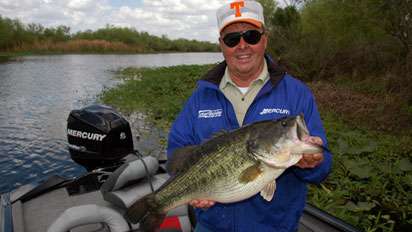
When autumn arrives in many areas of the country, huge reservoirs are drawn down to winter pool. So falling water is nothing new at this time of year for many anglers, and now is a good time for us to consider it and its effects on our fishing trips.
Of course, any time of year water levels can drop naturally via drought or through flood control or hydro-electricity use at dams. But regardless of the reason, the fall can result in puzzling situations for anglers, and it doesn’t matter what species they may be after.
Now, a fall of an inch or so is not normally enough to affect fish, but a drop in level of a foot or more can and does change their habits. And if the drop is great enough to leave most of the cover exposed, then a real problem exists. The fish can be very hard to find.
Fish like bass are object-oriented — especially in stained to murky water — and they like to relate to objects, even if it may seem insignificant to the fisherman.
Knowing the real estate of a lake before it falls can be a major plus. Any submerged point, channel, brush or secondary banks are the places that bass tend to congregate, so today’s electronics are a definite plus, as is any advice you might get from locals.
While lake levels are low (via fall/winter drawdown or whatever), consider making some notes with your GPS and mapping software. Digital photos or video clips are added bonuses that will help you understand what’s below, and perhaps where fish will go at various stages as water levels fall. Let’s face it, graphs are great, but having actually viewed what’s down there can pay off weeks, months and even years later.
Another important note to remember is when levels are low or falling, baitfish will have to concentrate deeper, usually over a ledge or farther out on a point, flat or secondary bank. (And you can bet the bass will follow.) The smart angler fishing falling water will likewise go out and fish the mouths of creeks or coves.
As far as what to chunk and wind, well, I think crankbaits are an excellent choice during these times.
Also consider that if the water drops fast, the situation can be similar to a fast rise — it will take the fish a few days to acclimate to the sudden change. In this scenario, and if you have the luxury of making the choice to fish another day, well, you might want to wait a few days to allow the fish to become accustomed to the change. After they have acclimated to the change, you will be more likely to get bit!
For more words of wit and wisdom from one of our sport’s greatest legends, check out www.billdanceoutdoors.com.

